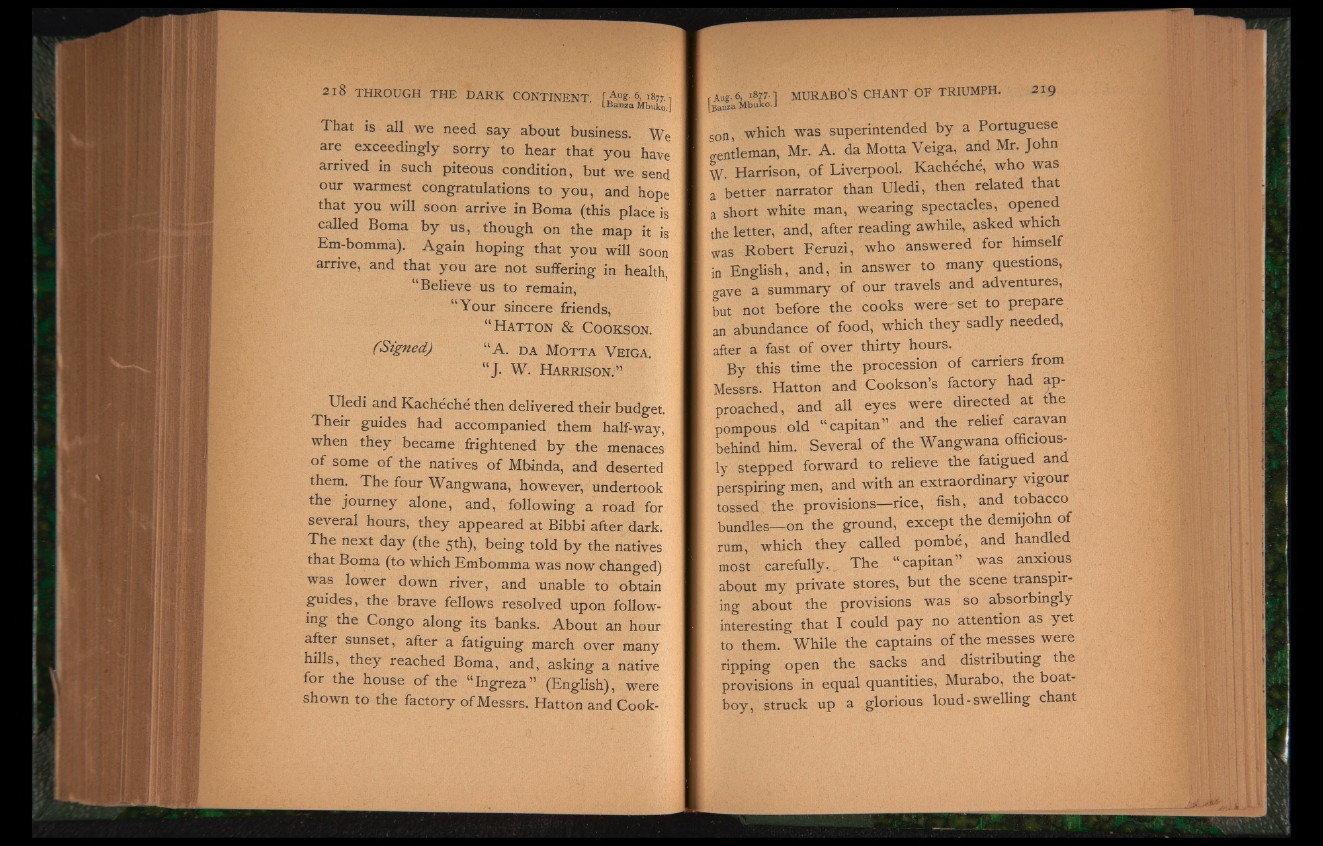
2 l 8 T H R O U G H T H E D A R K C O N T IN E N T f Aug- 6, 1877,■,
LBanza Mbuko.J
That is all we need say about business. We
are exceedingly sorry to hear that you have
arrived in such piteous condition, but we send
our warmest congratulations to you, and hope
that you will soon arrive in Boma (this place is
caUed Boma by us, though on the map it is
Em-bomma). Again hoping that you will soon
arrive, and that you are not suffering in health,
“Believe us to remain,
“Your sincere friends,
“ H a t t o n & C o o k s o n .
(Signed) “ A . d a M o t t a V e i g a .
“ J. W . H a r r i s o n . ”
Uledi and Kacheche then delivered their budget.
Their guides had accompanied them half-way,
when they became frightened by the menaces
of some of the natives of Mbinda, and deserted
them. The four Wangwana, however, undertook
the journey alone, and, following a road for
several hours, they appeared at Bibbi after dark.
The next day (the 5th), being told by the natives
that Boma (to which Embomma was now changed)
was lower down river, and unable to obtain
guides, the brave fellows resolved upon following
the Congo along its banks. About an hour
after sunset, after a fatiguing march over many
hills, they reached Boma, and, asking a native
for the house of the “ Ingreza” (English), were
shown to the factory of Messrs. Hatton and Cookr
Aug- 6. i877 ] M U R A B O ’S C H A N T O F T R IUM PH . 2 1 9
[Banza Mbuko.J
son, which was superintended by a Portuguese
gentleman, Mr. A. da Motta Veiga, arid Mr. John
W. Harrison, of Liverpool. Kacheche, who was
a better narrator than Uledi, then related that
a short white man, wearing spectacles, opened
the letter, and, after reading awhile, asked which
was Robert Feruzi, who answered for himself
in English, and, in answer to many questions,
gave a summary of our travels and adventures,
but not before the cooks were set to prepare
an abundance of food, which they sadly needed,
after a fast of over thirty hours.
By this time the procession of carriers from
Messrs. Hatton and Cookson’s factory had approached,
and all eyes were directed at the
pompous old “ capitan” and the relief caravan
behind him. Several of the Wangwana officiously
stepped forward to relieve the fatigued and
perspiring men, and with an extraordinary vigour
tossed the provisions—rice, fish, and tobacco
bundles— on the ground, except the demijohn of
rum, which they called pombe, and handled
most carefully,. The “ capitan” was anxious
about my private stores, but the scene transpiring
about the provisions was so absorbingly
interesting that I could pay no attention as yet
to them. While the captains of the messes were
ripping open the sacks and distributing the
provisions in equal quantities, Murabo, the boat
boy, struck up a glorious loud-swelling chant